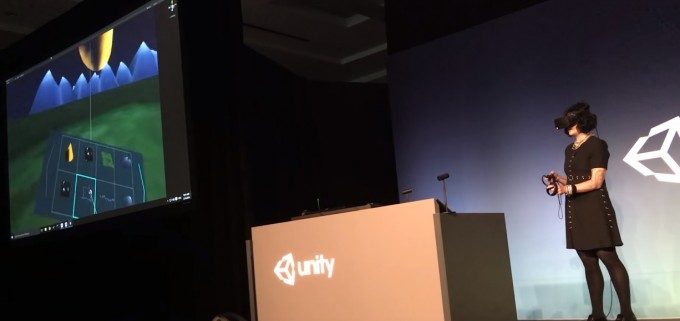At a special event at GDC this morning, Unity’s Principal Designer Timoni West showed off the latest prototype of Unity’s new Virtual Reality editor that lets you build VR applications and games as if you were a god.
The two biggest game engines out there are laser focused on making developers’ lives as easy as possible to create immersive content. What’s more, both Epic Games, creator of the Unreal Engine and Unity believe that the next step for fast prototyping and intuitive VR creation is to let the creator build his VR world inside VR itself. It’s a logical idea, but throwing away decades of 2D menu design and accepted knowledge is no mean feat.
On stage at a special event at GDC last week, Unity’s Principal Designer Timoni West donned an Oculus Rift and, wielding 2 Oculus Touch controllers, demonstrated to the audience what progress their team has made toward that VR in VR creation goal – be creating an entire virtual scene from scratch in just a couple of minutes.
The video above shows off lots of interesting features, most immediate is the user interface, which should be fairly transparent from the video. But West was focusing in this presentation on a new feature that’s designed to speed up the world building process, they call it the Chess Board. Think of this as an overarching mini-map, displaying an aerial view of the world you’re creating but positioned within the world itself.

You can zoom out and in for different scale operations, but the most powerful aspect of the Chess Board is to allow creators to rapidly drop assets into your scene wit minimal scrolling or physical movement. This sounds fairly pedestrian, but watch as West uses the Chess Board view to grab and move an entire mountain range via the board and the world around her alter to match. Aside from making workflow in VR more efficient, as you’re in VR you instantly get a feel for the scale of the object that’s being moved and whether your intended new location for it works. Designing just as you might were you a God.
Also note the use of dual wielded Oculus Touch controllers for for intuitively ‘handling’ virtual objects, scaling, moving and rotating them before dropping them by hand onto the chessboard. Seen slightly more clearly in VR Scout’s video below.
It all looks extremely promising, so when can developers expect to get their hands on it? Unfortunately West said there’s nothing to share yet, merely that they’re working hard to get it ‘done’ as soon as possible.






